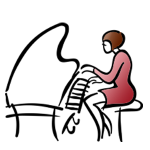Cross-posted at the Detroit Symphony Blog.
Sometimes before I go to an orchestra concert, I think to myself, “I should listen to a recording of the pieces on the program before I go, so that I can better appreciate the music when I’m hearing it live.” But actually I tend to reject the idea, though, because I enjoy the thrill of being surprised, hearing something for the first time (or for the first time in a long time.)
So I didn’t listen to the Mozart or the Holst before Friday night, and I don’t regret that decision at all. The Holst was absolutely thrilling live, as familiar as several passages are. I was glad to listen to Mozart’s music through the prism of festival host Tom Allen’s on-stage comments. He spoke of the desperate straits Mozart found himself in while writing this transcendent music. Mozart’s financial troubles and health problems are well-known, but contemplating the contrast between his life and his work added a poignant dimension to the listening experience.
Something kept nagging at me, though.
I love hearing orchestral music live, whether it’s music I know well or a piece I’m hearing for the first time. I love watching the musicians on-stage, and I also play a little game with myself trying to sense how the audience around me is responding to the music (as I pray that no one will decide to unwrap a cough drop during a quiet passage, ahem!).
But I wonder, when a piece is as seminal as Mozart 41, is it really possible to hear it differently? Can we come to it with new ears? And if so, how do we do it?
I’ve been thinking lately how odd it is that we go to the symphony to hear music we’ve already heard before. Why bother? Why get all dressed up, pay for tickets and parking, and fight traffic just to hear music you already know? Do we do the same for other art forms? We go to the movie theater to see the latest release, not something we own on DVD and have watched any number of times, right?
Well, not exactly, evidently. Some classic movies get audiences out of the house, whether they’re available on video or not. Then there are rock concerts. The audience goes wild when the band plays their biggest hits, but this can be frustrating for the band members, who might be more excited about playing cuts from their latest album. But audiences can get mighty testy if their expectations aren’t met. I’ve read that the singer Ani DiFranco got so tired of her audiences drowning her out singing along with her songs that she changed them around and made it impossible for the audience to sing along. The people were not pleased!
Being a composer myself, I confess that I get impatient sometimes with what sometimes seems like a form of musical ancestor worship. How’s a living composer supposed to compete? I think what it comes down to is, there are (at least) two kinds of listening experiences that a classical concert provides, and they’re pretty distinct from each other.
The Trust Walk
The less common experience is the thrill of hearing something for the first time. I know that many people get frustrated with unfamiliar works; It can be so hard to know what to expect. When you’re hearing a brand new piece by a composer you may never have heard of, it can really feel like a roll of the dice (or worse, a game of musical Russian roulette!). Will the music be spiky and dissonant or smooth and consonant? Will it use the repetitive techniques of minimalism, or will it be formally idiosyncratic? You can’t know for sure until the music starts, even if you have program notes or the composer’s comments to prepare you.
The biggest favor you can do for the composer is to be willing to be taken on a journey along a road you’ve never traveled before. It might feel a bit like a “trust walk,” where you’re blindfolded and have to have faith that the person guiding you won’t walk you into a wall. Fortunately, you can’t hurt yourself too badly listening to music, even if you don’t end up liking a particular piece.
The Familiar Path
Even though I’m a composer, and therefore a new music enthusiast, I still understand the appeal of hearing a piece you love and know well. It’s a powerful experience. I think it’s worth exploring why it’s so powerful, though — it has to be more than just the comfort factor. If you come to a concert simply to be made comfortable, expecting the music to function like an aural security blanket — well, I don’t mean to scold, but you need to do a little homework. You need to eat your veggies before you can have your dessert. 😉 I’ve written before about my professor John Swackhamer, who responded to students’ complaints about modern music that they “couldn’t understand” with the damning rhetorical question, “Do you think you understand Beethoven?” No matter how familiar and beloved a piece of music is, it should never be treated like audio wall paper — unless that’s what the composer intended, of course! 😉

If you enjoyed this post, would you consider…
Thanks — you make the world a better place! 🙂



Hi it is FestinaLente from SP. I saw your link and decided to stop by- what a great blog!!
I loved what you said here – very beautiful.
I shall return. Peace to you!
Thanks for your kind words, Fran!
Where did Miss Music Nerd go?
There she was, and then there she wasn’t.
I had gotten used to the solace of a MMN post-a-day.
Now, I only have my own miserable existence to endure.
When will this living Hell come to an end, or is this eternal damnation?
When I was a very young cub, I had the occasion to visit the Rijksmuseum in Amsterdam. The year was 1976, and I had just finished my first year of studies toward a music degree at my local community college. I was not much acquainted at all with the visual arts. When I walked into the room that displayed Rembrandt’s “Night Watch,” I knew immediately that I was in the presence of something great—something much, much larger than myself or my ability to comprehend it. There was so much to absorb from this magnificent painting that I could have stood there all day and not taken it all in, let alone completely understood the work. The textures, the colors, the form, and the sheer magnitude of this work: they completely overwhelmed the senses and the mental processing ability of this young aspiring musician who, up until that time, thought he knew a thing or two about the arts.
I think that it is the same with music, even music that we know very well. There is always more to discover in a well-known work. When I listen to a Beethoven Symphony, or string quartet, concerto, or sonata, it is nearly like listening for the first time, every time, even though I know some of this music so well that I can pick any part and sing along without missing a note. I am in awe of this magnificence, and I appreciate so much more about it at the age of 50 than I ever could have at the age of 20. Some of that deeper insight must come from age. I would not have thought that possible at the age of 20, but clearly see it now. The musical senses become more full-bodied and infused with fine nuances of appreciation and understanding as we age; much like a fine wine that has been allowed to sit on the rack for years.
As to why we go to live performances to hear music that we have heard a hundred times before: A live music performance is to a recording exactly what seeing the “Night Watch” at the Rijksmuseum is to seeing this work in a book at the library.
Pingback: Rembrandt, Beethoven, And The Rest Of Us « Meandering Missives & Musings